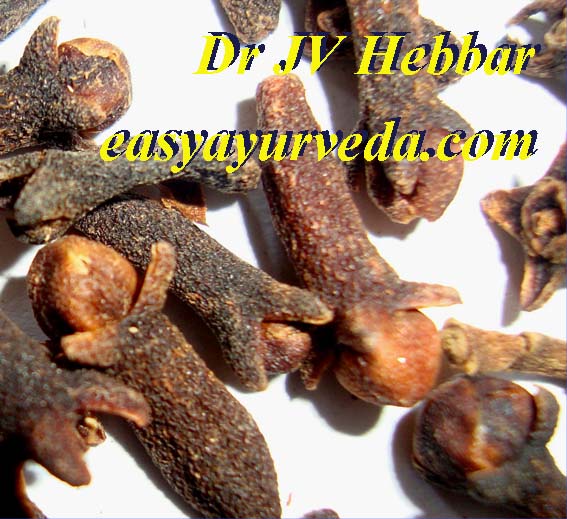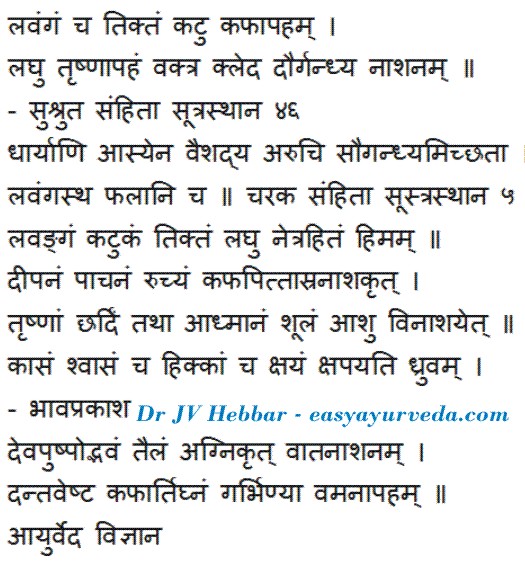Clove And Clove Oil Benefits, Usage, Dose – Complete Ayurveda Details
Clove is an important Ayurveda spice, used both for culinary and therapeutic purposes. Its botanical name is Syzygium aromaticum. It belongs to the Myrtaceae family (Lavanga Kula). Interesting fact about clove is, though it is hot to taste, it is cooling and soothing to the stomach.
Latin synonyms:
Caryophyllus aromaticus L.
Eugenia aromatica (L.) Baill.
Eugenia caryophyllata Thunb.
Eugenia caryophyllus

Table of Contents
Medicinal qualities, Uses
Medicinal qualities of Clove:
Rasa (taste): Tikta (bitter), Katu (pungent)
Guna (qualities): Laghu (light to digest), Snigdha (unctuous, oily)
Vipaka (taste conversion after digestion): Katu (pungent)
Veerya (potency): Sheeta (cold)
Effect on Tridosha – Kaphapittahara – balances Kapha and Pitta
Medicinal uses of clove:
Trushnapaha – relieves excessive thirst
Vaktra kleda daurgandhya nashana – relieves bad breath and excessive sliminess of oral cavity
If it is kept in the oral cavity for a few minutes, it brings in clarity, relieves tastelessness and bad breath.
Netrahitam – good for eyes
Deepana, Paachana – improves digestion strength
Ruchya – improves taste
Pittasranashana – useful in bleeding disorders
Useful in
Trushna – Excessive thirst
Chardi – vomiting
Adhmana – bloating, gaseous distension of abdomen
Shula – abdominal colic pain
Kasa – cough, cold
Shwasa – Asthma, COPD, wheezing, breathing difficulty
Hikka – hiccups
Kshaya – chronic respiratory disorders

Clove dose
Lavang Powder – 1 – 2 grams per day.
Clove oil dose – 1 – 2 drops.
Dose of clove buds – 2 – 3 per day.
Clove oil benefits
Clove oil increases digestion power. It balances Vata and Kapha, useful in aches and pains, useful to relieve toothache. It is also useful in relieving morning sickness in pregnant women.
Clove oil is used as an ingredient in mouthwash liquids to treat halitosis / bad breath. Example: Refresh Mouthwash.
Research, Side effects
Research: Researchers from the Miguel Hernández University have found that clove is the best antioxidant spice, as it contains high levels of phenolic compounds. Clove has the highest capacity to give off hydrogen, reduced lipid peroxidation and reduces Iron efficiently.
Side effects: There are no known side effects of clove. As a food ingredient, it can be used during pregnancy, lactation period and in childhood.
Interaction with medicines, supplements
Can this be used while taking Homeopathic medicine?
Yes. This product does not react with homeopathic medicine.
Can this medicine be continued while taking supplements like multivitamin tablets, Omega 3 fatty acids etc?
Yes. Generally, this product goes well with most dietary supplements. However, if you are taking more than one product per day, please consult your doctor for an opinion.
With western
medicines
Seek your
doctor’s advice if you are taking this product along with other western
(allopathic / modern) medicines. Some Ayurvedic herbs can interact with modern
medicine.
If both Ayurvedic and allopathic medicines are advised together, then it is
best to take Allopathic medicine first, wait for 30 minutes and then take the
Ayurvedic medicine.
Ayurvedic medicines
Ayurveda medicines with Laung as ingredient:
Lavangadi Vati – used in cough, cold, allergies
Himasagara Tailam– used in frozen shoulder, lock jaw etc.
Madana Kameswari Lehyam – aphrodisiac
Halin drops – decongestant
Bala Tel – cold, cough, vomiting, bloating etc.
Clove for dry mouth
Put 4-5 cloves in your mouth and swirl them around or suck on them. They are effective in stimulating saliva & they can make your mouth feel fresher.
Clove to improve peristalsis
Traditional usage of clove indicates that it improves peristalsis (intestinal movement). In Ayurveda terms this translates to vata anulomana. (source)
In Chinese medicine clove is used for directing stomach “qi” energy downward, and to treat hiccup — indicating vata anulomana qualities. – Satyan Namdhari
Vernacular names, Sanskrit synonyms
Hindi name: Laung, Lavang
Telugu name: Lavangamu, Karavallu
Gujarati, Kannada name: lavanga
Tamil name: Kirambu
Malayalam name: Grampoo
Sanskrit synonyms:
Devakusuma – flowers are used to worship god
Bhringanga, Shekhara, Shri Prasuna – having beautiful flower
Chandanapushpaka – flower having fragrance like sandalwood
Varija – usually found in islands
Grahanihara – Cures grahani roga
Srisamja – Lavanga is auspicious
Classical categorization
Bh. Pr. ni – Karpuradi varga
Distribution
In India, it is available in Tamil Nadu and Kerala.
It is abundantly found in Sri Lanka, Mauritius, Tanzania and Singapore.
Morphology
An evergreen small tree reaching a height of 20 -30 ft.
The stem is hard with pale yellowish or gray bark and has a smooth surface.
Leaves – Simple, Opposite, obovate, petiolate, acute, leathery, gland dotted
Inflorescence- Axillary cymose inflorescence
Flowers- White, complete, bisexual, Corolla with four petals and it is free. Flower bud is clustered at terminal branches, greenish to pink and highly aromatic. Dried cloves are nail shaped, reddish brown in colour, 1 to 2 cm long, rough to touch, cylindrical base, crowned with plum ball like unopened corolla. Surmounted by four toothed calyxes.
Fruit- Fleshy, dark pink, drupes
Seeds- Oblong, soft and grooved on one side.
Useful part-Flower bud.
Flower bud is reddish brown in colour and up to 1.7 cm long. It has got a slightly flattened stalk (Hypanthium) and a head composed of four calyx teeth and a globular portion in the center, consisting of stiff leathery petals and numerous incurred stamens surrounding the style. Clove has a strong spicy odor, aromatic and tastes pungent.
Adulterant
Mother cloves, blown cloves, clove stalks, Exhausted clove
Collection
Cloves are hand picked or collected by beating with bamboo. Cloves are to be collected when the cloves start changing their colour from green to slightly pink. The cloves are dried in the sun and freed from foreign material and graded.
Sthanika karma (Systemic Acton)
Externally –Anti microbial, stimulant, External application of its paste on forehead is beneficial in headache. Indicated in oral/ throat disorders. Paste is indicated in skin disorders, Oil is beneficial in Rheumatic joint pain, Low backache, Sciatica, and Pain of vata origin. Lavanga oil can be applied over the gum region in case of toothache. Oil is also indicated for external application in impotency.
Internally
Digestive system –Carminative, digestive, improves taste, stimulates salivary glands to secrete salivary juice and helps to prevent dryness of mouth. Cleanses the mouth, and prevents bad odor. Antispasmodic, and liver stimulant. Indicated in Anorexia, Indigestion, colicky pain, Gastritis, vomiting, excessive thirst, Liver disorders, Malabsorption syndrome
Circulatory System – Stimulate heart and circulatory system. Elevate blood pressure. Indicated in Syphilis.
Respiratory System – Eliminate excess kapha . Indicated in kasa (Cough), breathing difficulty, hiccough
Excretory system – Increase urine production by stimulating the kidney. Indicated in painful urination
Reproductive System – Purifies and increases breast milk production. Aphrodisiac
Satmikarana – Indicated in general debility











19 comments
Claudia
Very Useful, thank you
Daisy
One correction- in Malayalam clove is grampoo similar to Tamil. 🙂
canis
Can pitta type use clove daily? Is it too heat ? How many should be consumed each time?
Dr J V Hebbar MD(Ayu)Author
Hi, if a Pitta body type person can take clove daily. Clove decreases Pitta. 3 – 5 of it can be consumed on daily basis.
Dr J V Hebbar MD(Ayu)Author
Clove is one amazing herb to reduce Pitta and Kapha.
It is safe to consume it if there is increase of Pitta in intestine.
Word of mouth wisdom is that it is hot. Traditional wisdom is what the above Sanskrit verses say.
Moderator -BST-
But vipaka is katu so would it not disturb pitta in intestines in the long run? Also since its cooling/shita, does it mean it increases vata?
Thanks again for taking time to explain ayurveda to the masses Dr!
Dr J V Hebbar MD(Ayu)Author
Sheeta Veerya balances out Katu Vipaka, hence it does not disturb Pitta in the long run. Katu Vipaka also ensures that it is not coolant in a big way (this is why, it balances Kapha Dosha).
All things that are Sheeta does not necessarily cause Vata Dosha increase – cow milk, for example.
Moderator -BST-
Much thanks Dr Hebbar for the precise explanation.
shubham patil
it does the pitta shaman on the basis of its shit veery it doesnt matter that it is having tikat and katu rasa and katu veepak though aamlaki is having the aaml rasa but it does the pitta shaman on the basis of its sheet veery some drugs are acting by its veery and prabhav too.
Gaurav
Per the above:
Clove effect on tridosha — balances Kapha and Pitta
Clove oil effect – balances Vata and Kapha.
Please explain why this difference. Is there a difference between the properties of the ‘bud’ of the clove and the ‘stem’?
Dr J V Hebbar MD(Ayu)Author
There is subtle difference between clove and clove oil effects on body due to slight variation in chemical composition between the two. It is difficult for me to precisely point out these volatile oils and chemical principles.
I do not think there is much difference between its bud and stem.
Dr Rekha
reference of lavanga taila ? in reference to use in dental pain
Dr J V Hebbar MD(Ayu)Author
Hi, Kaiyadeva Nighantu mentions Lavanga as one of the Danta Shodhana and Shoolahara Dravya
Bhavaprakasha explains it as Ashu Shoolahara. Based on these, clove oil is used for dental pain.
I am yet to come across direct reference of clove oil.
Cook
It’s the essential oil pressed or extracted through steam correct? There is more dryness of the clove when it is whole/dried, and more wetness and heat when extracted through pressing or steam, maybe? If clove is nearly balanced for treating tridosha to begin with, maybe this sort of small difference is what tilts it one direction or another. (I mean to explain it metaphorically without use of chemistry.) Does that sound correct sir?
Satyan Namdhari
Traditional usage of clove indicates that it improves peristalsis. In ayurvedic terms this translates to vata anulomana.
http://www.ijrap.net/admin/php/uploads/360_pdf.pdf
In Chinese medicine clove is used for directing stomach “qi” energy downward, and to treat hiccup — indicating vata anulomana qualities.
https://en.wikipedia.org/wiki/Clove
Dr J V Hebbar MD(Ayu)Author
Thank you very much for the value addition sir 🙂
Jaswinder Kaur
Hi there,
Very useful information and I read some comments too.
I’m using cloves oil for more than 13 years for my body aches. Whenever I’ve body pain; such as back pain, shoulder pain or neck pain, I massage pure clove oil and instantly, I started to feel better.
This is the natural way to get benefit for pains.
Thanks.
Sharon
Hi there, I am new to Ayurveda, and just wanted to clarify if the Clove oil would then still be classified as cooling, even with the shift to Vata and Kapha pacifying? Thank you
Dr J V Hebbar MD(Ayu)Author
No. It is considered hot